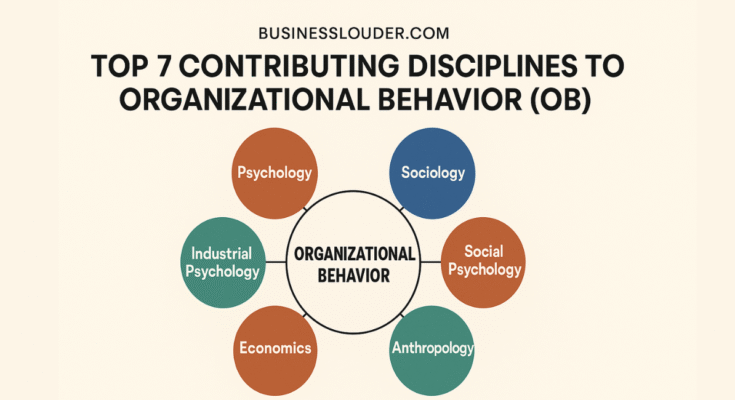Organizational behavior (OB) is a multidisciplinary discipline that studies the behavior of individuals and organizations within groups and how it influences the general performance and effectiveness of the employer.
It combines diverse disciplines to benefit deeper expertise of human behavior within the workplace and to broaden techniques for improving organizational overall performance.
The significance of organizational behavior in the place of a job can’t be overstated. Via expertise in the behavior of individuals and agencies within the agency, managers and leaders could make knowledgeable selections, create wonderful environment surroundings, and decorate typical productivity.
Contributing Disciplines to Organizational Behavior
Let us discover some of the disciplines contributing to organizational behavior that contribute to organizational behavior and their importance.
1) Psychology
Psychology plays an essential role in an information person’s behavior inside agencies. It makes a specialty of the study of human behavior and mental tactics, presenting insights into various elements that have an impact on behavior inside the place of business.
Psychological theories help explain phenomena inclusive of motivation, activity delight, perception, and decision-making. By expertise in the psychological factors that force individuals, businesses can expand effective techniques to enhance worker motivation and productivity.
For instance, psychologists like Abraham Maslow and Frederick Herzberg have developed theories of motivation that have been significantly applied to know-how worker motivation inside corporations.
Know-how these theories allow businesses to identify the desires and motivations of their personnel and create work surroundings that align with the wishes, leading to higher job delight and advanced overall performance.
The following are only a few of the numerous regions of hobby in psychology:
- Basic Psychology
- Laboratory Psychology
- Applied Psychology
- Consumer Psychology
- Social and Personality Psychology
- Corporate Psychology
- Counselling Psychology
- Educational Psychology
- Psychologist session
Know-how psychological principles and their models significantly aid in studying the elements that have an impact on people’s behavior, consisting of the training process, leadership effectiveness, activity pleasure, individual selection-making, performance appraisal, attitude size, worker selection, job layout, and work stress.
The mastering method, motivational techniques, personality determinants, and improvement.
2) Sociology
Sociology examines the social structures and techniques that have an impact on behavior inside corporations. It provides insights into how socialization, organization dynamics, and organizational way of life shape individual behavior and interactions in the place of a job.
Sociological theories assist in explaining how individuals are motivated by social norms, values, and socialization techniques.
As an example, sociologist Max Weber’s concept of bureaucratic corporation gives a framework for information on how formal systems and regulations have an impact on behavior and decision-making in organizations.
By analyzing organizational tradition and social dynamics, companies can foster positive surroundings, enhance teamwork, and enhance worker pleasure and commitment.
The subsequent key sociological ideas; maximum sociologists today categorize their field as one of the following 3:
Sociology studies how people interact with one another, and conversation is a first-rate social influence. The examination of more than one behavior is known as sociology. A plurality sample of behavior is made from two or more interacting persons.
3) Social Psychology
Social psychology combines elements of psychology and sociology to take a look at how people are encouraged via social elements.
It explores how people’s thoughts, feelings, and behaviors are formed using social interactions and institutional dynamics. Social mental theories contribute to our information on teamwork, management, and communication inside agencies.
As an instance, the social identity principle explains how individuals derive their self-esteem and social identification from organization membership, which has implications for group dynamics and intergroup behavior within agencies.
With the aid of applying social psychology standards, agencies can create a supportive and collaborative environment, leading to expanded worker engagement and productiveness.
4) Anthropology
Anthropology gives valuable insights into organizational behavior by way of studying the impact of subculture and cultural differences on individual and group behavior.
It helps agencies understand how cultural norms, values, and ideals shape behavior, verbal exchange, and choice-making strategies in the place of business.
Anthropological research can help organizations understand the effect of cultural range on group dynamics and broaden strategies to sell inclusive and culturally sensitive environments.
By embracing cultural range and promoting inclusivity, businesses can create multicultural work surroundings that encourage creativity, innovation, and adaptability.
5) Political Science
Political science makes a specialty of the observation of power dynamics, decision-making processes, and organizational governance. It offers insights into how energy is sent and how political elements have an impact on organizational behavior.
Political science know-how theories contribute to our understanding of organizational politics, warfare resolution, and the impact of stakeholders on organizational choice-making.
By way of studying political science, corporations can increase powerful leadership strategies, manipulate conflicts, and enforce fair decision-making techniques.
Know-how power dynamics within businesses permit companies to ensure the fair and powerful distribution of energy, enhance management effectiveness, and sell participative selection-making, leading to worker empowerment and organizational achievement.
6) Medication
Medication contributes to organizational behavior through the study of occupational fitness and well-being. It examines how associated elements impact employees’ bodily and mental health.
Using the know-how of the relationship between environments, pressure, and worker well-being, corporations can lay out rules and practices that sell worker fitness and decrease absenteeism.
Occupational health studies carried out with the aid of medical specialists present valuable insights into the effect of labor-associated stressors, activity layout, and existence stability on employee well-being.
Organizations can utilize this understanding to create a more fit work environment and enforce practices that aid employee wellbeing, in the end enhancing organizational overall performance.
7) Economics
Economics affords insights into how economic elements affect organizational behavior and effects. It examines topics inclusive of resource allocation, incentives, and decision-making methods inside groups.
Knowledge of financial standards and theories enables companies to make informed choices concerning resource allocation, value-effectiveness, and economic incentives.
By thinking about economic elements, agencies can expand techniques that optimize aid allocation, enhance performance, and decorate average overall performance.
Economics also contributes to our know-how of market dynamics, permitting organizations to evolve to changing marketplace situations and hold an aggressive side.
Conclusion
In the end, organizational behavior is a multidisciplinary discipline that draws insights and understanding from various disciplines of OB.
Psychology, sociology, social psychology, anthropology, political science, medicine, and economics all contribute to our information on the way people, companies, and systems within organizations interact and have an effect on behavior.
Through thinking about the contributing disciplines to organizational behavior, agencies can develop techniques for enhancing organizational performance, developing fantastic surroundings, and enhancing usual productivity.
We hope that you have understood the contributing disciplines to organizational behavior. If you still have any queries related to disciplines contributing to organizational behavior, let us know in the comment section below, will help you.
Read More:




One Comment on “Top 7 Contributing Disciplines to Organizational Behavior (OB)”